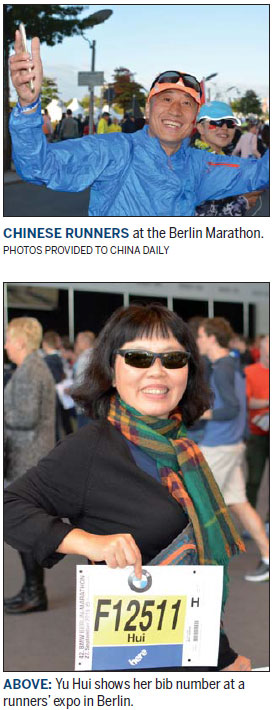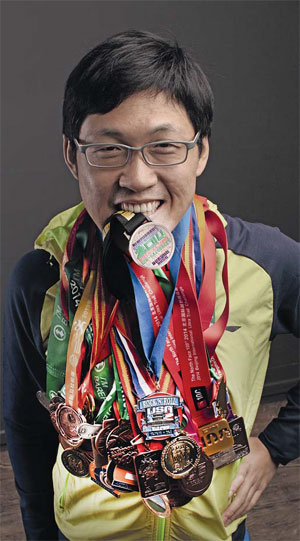Running the world
Updated: 2016-04-29 08:24
By Matt Prichard, Yan Dongjie and Yu Yilei in Beijing and Wang Mingjie in London(China Daily Europe)
|
|||||||||
New type of athlete
The new Chinese marathoners who can afford to go globe-trotting are mostly within the social status and age groups that have led China's modernization and economic rise in recent decades.
Chinese runners at this year's London Marathon included 30 from the mainland led by Tian Tongsheng, 63, one of the founders of Runnar, a company that organizes trips and assists marathoners.

"We have corporate executives, entrepreneurs, businesspeople and employees of global Fortune 500 companies, who are considered China's emerging middle class and usually hold new ideas about health," he says. "Running marathons to them has become a new normal, a new lifestyle."
Tian certainly breaks the traditional mold of aging in China, where the retirement age for men is 60. He was one of the over-60s runners to finish the World Marathon Majors - Tokyo, Boston, London, Berlin, Chicago and New York. Prior to this year's London event, he had completed 73 marathons, including 16 last year, half of which were international races.
Others have done their own analysis of Chinese marathoners.
"I see two categories: one that is rich and well educated; the other that is rich and less educated," says Oliver Qi Wang, founder and director of Runbuk, a startup registered in the United States in March that provides services to Chinese marathoners abroad.
The first group, which may have advanced academic degrees, comprises some 65 to 70 percent of runners registered with his company. Many of them live in China's biggest cities.
The second group, which makes up 30 to 35 percent, is also well-off, but many of them did not go to college, he says. They include entrepreneurs and those from smaller cities who have worked hard to pull themselves up by their bootstraps but are now concerned about their health.
Ninety percent of those who run outside China were born in the 1960s and '70s, putting them between the ages of 37 and 56, he adds. The rest are at most 10 years younger or older.
Oliver Wang, who is also CEO of Beijing-based Palace Travel and its US branch, which has runners as clients, too, describes the situation as part of a trend that started earlier in the West, in which the wealthy middle-aged started spending lots of money on fancy bicycles, for example, instead of on sports cars.
"It's a kind of lifestyle over luxury, from spending a lot on luxuries to spending a lot on health," he adds.
Domestically, marathon fever has exploded in China. In 2014, the Chinese Athletics Association registered 51 marathon events and 900,000 runners nationwide. That mushroomed to 134 marathons and 1.5 million runners last year, according to Wang Dawei, vice-president of the CAA, which now has a marathon department. Already this year, nearly 170 marathons have been registered.
Cool running
Du says one of the reasons for the explosion in travel is that people who have run the relatively new marathons in China are looking for a taste of better-run races abroad, as well as higher athletic levels.
But in addition to that, what could be cooler than posting a selfie as you cross the finish line in Paris, Boston or Berlin, or wrapped yourself in the national flag like an Olympian?
|
Beijing running coach and freelance journalist Wang Xiaogang with his medals. He frequently takes part in overseas marathons. |
"It's not a decisive factor, but posting pictures on Chinese social media while taking part in running events in exotic locations is seen as a trendy thing for some runners," Du says.
Xie, from Shanghai, says running now dominates her life, socially and professionally. "Marathons are also a way to have a social life. I have met many friends running. It's why we get together," says the entrepreneur, who quit running a real estate company to start Save U Sports Development Co, which helps clients with equipment and advice.
Some Chinese runners are also combining marathons, social media and social responsibility.
Li Xibei, 30, an information technology worker from Central China who lives in New York City, raised funds to provide cleaner air for families in his homeland by running the North Pole Marathon this month.
Using Crowdrise, a crowdfunding website, he raised $6,030 - 18 percent more than his target sum - for the Blue Sky Lab campaign run by Friends of Nature, one of the oldest environmental NGOs in China. The program purchases materials and teaches students from low-income families in Beijing to assemble do-it-yourself air filters. The money Li raised is expected to benefit 177 families.
"I abuse myself by running in extreme sub-zero temperatures in the North Pole and you donate to help the kids in China breathe cleaner air at home," he wrote on his Crowdrise page.
Li and a female compatriot, Fan Beibei, were among about 50 runners from 20 countries who braved temperatures as low as -40 C to complete the 42-km event, which was postponed several times due to cracks in the ice. Armed guards stood watch during the race to protect runners from the threat of polar bears.
Li is also one of a small but growing group of Chinese who have completed marathons on every continent, including Antarctica.
Yet despite the current enthusiasm, the Chinese have shown themselves to be somewhat fickle in terms of their motivation for traveling abroad.
A few years ago, sports league-themed tourism prevailed, Du says. "Then, it was outdoors, and now it's running. Many runners are actually traveling in the name of running marathons."
So is it all just a fad? A number of factors suggest it isn't.
Today's Top News
Warren Buffett optimistic on China's economic transition
Hawking answers ancient Chinese philosophical question
Running the world
Getting back to basics
Alibaba denies reported takeover of AC Milan
China stresses Putin's expected visit
Russia launches rocket from Vostochny Cosmodrome
Record number of Chinese exhibitors at Spanish expo
Hot Topics
Lunar probe , China growth forecasts, Emission rules get tougher, China seen through 'colored lens', International board,
Editor's Picks

|

|

|

|

|

|








